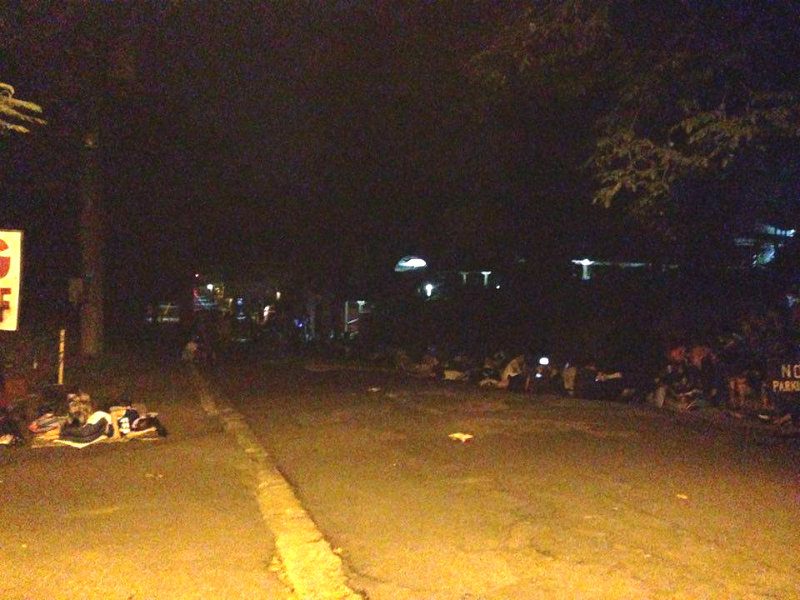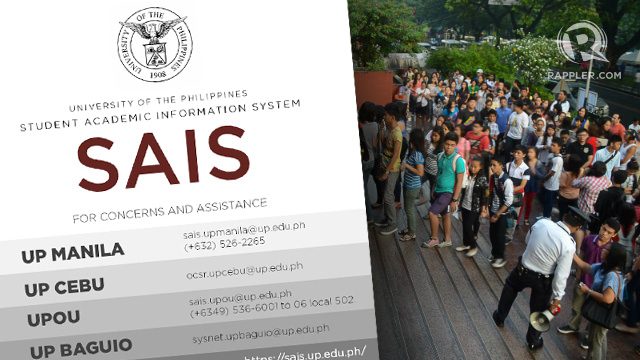SUMMARY
This is AI generated summarization, which may have errors. For context, always refer to the full article.
 I do not claim to be an expert on the registration procedures of UP Diliman (UPD). I just hope to shed some light on the problems that pervade the registration process in UPD every semester and, if possible, suggest solutions.
I do not claim to be an expert on the registration procedures of UP Diliman (UPD). I just hope to shed some light on the problems that pervade the registration process in UPD every semester and, if possible, suggest solutions.
My views, however, are limited and influenced by what I have personally seen, heard from students, and read from various Facebook posts during the past few days.
On Monday, August 1, news of students camping outside of the College of Social Sciences and Philosophy (CSSP) circulated online.
The students lined up (camped out) for various General Education (GE) courses offered by CSSP and the College of Arts and Letters (CAL). According to some claims, the line started as early as 7:30 pm, while others claim that it was 10:30 pm. The point, however, is the fact that students had to line up at night for a chance to secure a class slot.
It seems that there are at least two problems that stand out: 1) shortage of class slots; and 2) having to fall in line for long hours for a class slot. The blame, of course, is directed at the UP Administration, but I am of the opinion that the problems stem from different sources.
Causes of the problems and proposed solutions
Curriculum
The respective curriculum of various degree programs reflect that required GE courses should be taken during either of the first two semesters of freshman year. Thus, if UP admits 3,000 freshmen, then it would follow that departments that offer required GE courses should open 3,000 slots during the academic year to service these students. In reality, satisfying this this demand is highly unlikely.
If we do the math, if a class is composed of 30 students, then 100 sections should be opened to service 3,000 students. Divide this by two semesters, then that would be 50 sections per semester.
The normal teaching load for a UP faculty is 12 units, i.e. four sections. Thus, at least 12 faculty members are needed to open 50 sections for one subject alone per semester. Other non-required GE courses, major courses, service courses, and graduate courses are not yet considered in this equation.
Some classes in Philosophy 1, for instance, which is a required GE subject, sometimes take in as much as 45 students just to help meet the demand. This entails unnecessary stress to professors who are expected to do research and fulfill their administrative responsibilities aside from teaching.
Proposed solution: Required GE courses should be spread out in the curriculum. This requires curricular change. If required GE courses are evenly distributed in the curriculum, then it is less likely that students will compete with each other to secure slots.

Cancellation
Some students line up despite full slots because they are hoping that other students might cancel. We cannot really tell our students to give up hope, can we?
Proposed solution: The CSSP Registration Committee prioritized graduating students for slots that were freed up due to cancellations because they need it more than regular students. As part of the said committee, I fully stand by this decision.
Student preference
There are students who enlist in GE courses despite the fact that they do not need to take them yet as per their curriculum because they want to focus on their major subjects later on. This is understandable, but it contributes to the problem since they deprive those who are required to take the course in a particular semester of slots.
Proposed solution: For students: Do not be a part of the problem. Take it when your curriculum indicates that you need to take it, and not before.
For the administrators: Perhaps we can request the Computerized Registration System (CRS) Team to come up with a system that would indicate if the student really needs to take the particular course during the semester when they are trying to enlist in order for departments to prioritize giving slots to students who are actually required to take a particular course over those who are just trying to accomplish the GE requirements first.
No late payment policy
This policy resulted to students racing against each other in securing class slots so that they can pay on time. There are also financial issues, wherein a student can pay but the money will arrive after the set deadline. Not being able to pay on time would entail possible forfeiture of enlisted slots, which risks the student to underloading.
Proposed solution: Extend the deadline, or better, scrap the policy. The students should also be aware that UPD offers student loans at zero percent interest.
K to 12 program
The implementation of the K to 12 program resulted to a significant decline in student enrollment in UPD. The faculty members are required to have at least 12 units of academic load.
However, this has become a problem since there are fewer students to teach. Thus, in order to prevent faculty retrenchment (which I am personally thankful for), various departments have stretched the available student population until 2022. This means that fewer classes with fewer slots were opened, but all students will surely be provided a slot sooner or later.
Thus, a student may not be able to take Philosophy 1 this semester but it is very likely that the said student may be given a slot next semester. For this reason also, graduating students are given the highest priority.
Proposed solution: Whether or not President Rodrigo Duterte will suspend K to 12, the effects are already here. Hiring new faculty members would not be the best possible option, because that would put an additional strain in the faculty loading distribution. I do not have a clear solution regarding this. Right now, it is just a waiting game.

In summary
These, of course, are just my personal opinions. The perspectives of the administration might be different. What I invite the readers to do is that, if you have any problems, you can do more than just pointing out these problems by proposing solutions as well.
If you have other solutions aside from what I have written, please feel free to post them in the comments. We might get very useful ideas out of your suggestions.
Finally, regarding the eUP SAIS issue, I am in solidarity with those who believe that it would have been better of the funds were allocated to improve our home-grown CRS. (READ: 4 things to know about eUP’s SAIS)
The CRS Team, after all, I believe, are more than willing to improve the system so as to serve the whole UP System, given the support of the UP Administration. – Rappler.com
Leander Penaso Marquez teaches Philosophy at the University of the Philippines Diliman. He heads the Registration Committee of the Department of Philosophy and serves as a member of the Registration Committee of the College of Social Sciences and Philosophy.
Add a comment
How does this make you feel?
There are no comments yet. Add your comment to start the conversation.